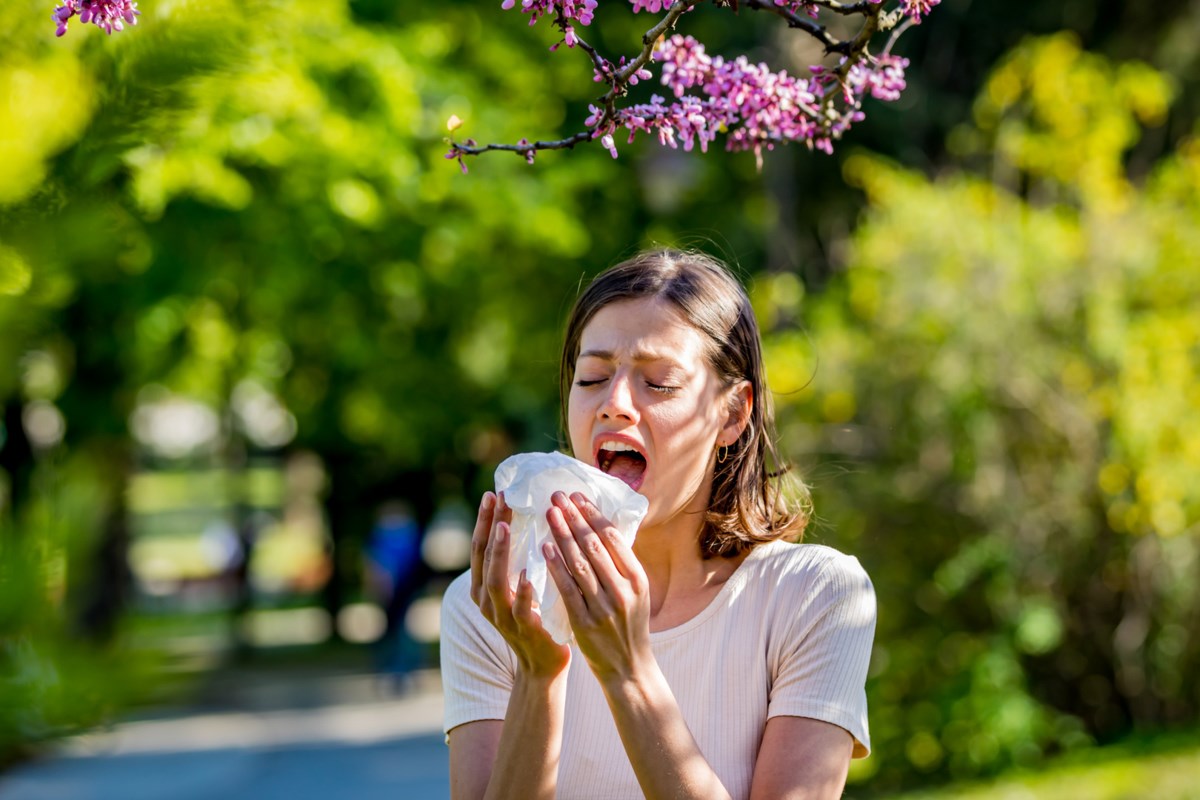
If you’ve been sneezing or stuffed up for the past few weeks, get ready for the long haul as allergy seasons in British Columbia are getting longer and more intense.
Allergists warn that global warming is the cause for the longevity of pollen seasons, which makes things complicated for determining if your sniffles might be symptoms of COVID-19 or allergies.
Thankfully, the experts have some suggestions when trying to determine if it’s a virus or seasonal allergies.
Glacier Media interviewed Dr. Stephanie Erdle, a clinical instructor in the division of allergy and immunology department of pediatrics at UBC and Dr. Amin Kanani, a clinical associate professor in the division of allergy and immunology at UBC, to find out what British Columbians should know when it comes to the allergy season this year.
When is allergy season in B.C.?
In British Columbia, we have two large allergy seasons categorized as tree pollen season and grass pollen season.
Currently, we are going through the tree pollen season. It starts in February and typically settles down by the end of May.
"But in May grass pollen starts and will go all the way to August,” says Kanani.
Erdle says the pollen season starts very early in B.C. and pollen counts are going up.
What are some common spring allergy symptoms?
Itchiness is the biggest giveaway to seasonal allergies, for both eyes and nose.
Is it allergies or COVID?
At first glance, it might be hard to determine what’s causing your sneezing or sniffles, but according to Erdle, there are a few signs to be on the lookout for.
"Although there are some overlapping symptoms, there are some pretty distinct symptoms between the two of them,” she says.
Overlapping symptoms include nasal congestion, stuffy nose and runny nose.
“There are a lot of symptoms that are pretty unique,” she says. "From the allergy side, the number one thing people complain about is itchiness and you don’t usually get that from COVID.”
Itchy and watery eyes are very common for allergies but not for COVID-19 symptoms and "stuffiness” is most likely seen in people with allergies, not COVID-19.
Kanani agrees the “itch” is often associated with allergies and not viral infections.
"With COVID-19, you can get a stuffy nose and runny nose. But typically with COVID-19 and other viral infections, you don’t get the itch,” he says.
Typical symptoms people can experience with COVID-19 and not with allergies include a fever, upset stomach, diarrhea and fatigue.
"With allergies, we don’t usually see fatigue,” he says.
Another obvious one for the two experts is how long the symptoms last. Allergies will last a few months, whereas if you’re vaccinated, your symptoms if sick with COVID-19 would not last very long.
What’s the most common allergy?
The leading cause of tree allergies in Metro Vancouver is alder and birch.
On Vancouver Island, there are a lot of oak tree allergies, according to Kanani.
"For tree pollen, it is alder and birch in B.C.,” says Erdle. “The next two most common are the whole cedar family and elm.”
Other common tree allergies in B.C. include ash, maple, mulberry and willow.
When will pollen go away?
Not until August.
Tree pollen season lasts until the end of May and grass pollen lasts until August.
What are the most common allergies kids get?
Erdle sees alder and birch being the two most common tree allergies in children.
She notes that it is rare to see allergies in children before age three and that they can pop up between age three and 10.
What allergy medication should I take?
Second-generation antihistamines are one recommended way to treat your allergies.
"The ones that we prefer are Reactine, Claritin, Aerius, Allegra,” says Kanani. “Or prescription ones like Rupall."
What allergy medication should my kids take?
"I tell families, 'Leave the Benadryl and go for one of the non-sedating antihistamines,” says Erdle. “They last longer, they work the same as Benadryl, but they don’t cross into the brain so you don’t get the drowsiness.”
There are some new treatments — like immunotherapy — that can change the immune system through shots.
"I don’t normally recommend this in kids as it’s weekly shots for six months, monthly shots for three to five years, which is not practical for children,” she says. "But there are some newer ones called 'sublingual immunotherapy' that are tablets that go under the tongue.”
Children take these tablets for six to nine months of the year for three years in a row.
“It can significantly improve symptoms,” she says.
This type of treatment is available for grass pollen, tree pollen, ragweed pollen and house dust mites.
"I’m seeing younger and younger kids where families are choosing that option,” she says.
What allergy medication should we avoid?
Both allergists say "second-generation" antihistamines should be used for both kids and adults.
"The older type we like to avoid because they have a lot more side effects, the main one being sedation and impairment,” says Kanani.
Erdle is advising people not to use Benadryl or similar medication like Tripolon.
"Benadryl is very heavily marketed towards children. We do not recommend Benadryl. It causes a lot of drowsiness, it crosses into the brain and you have to dose it very often,” she says. "Even though it causes drowsiness it really can negatively impact sleep and quality of sleep.”
Why are allergy seasons getting longer?
Trends over the past couple of decades indicate that global warming is having an impact on the allergy seasons in B.C.
"With global warming, we are seeing higher pollen counts and longer pollen seasons so symptoms tend to be worse and that extends into kids as well,” says Erdle. "We are seeing these really long pollen seasons of people having symptoms as early as February going into the fall now."
Do I have COVID-19 or is it just allergies? - Powell River Peak
Read More

No comments:
Post a Comment